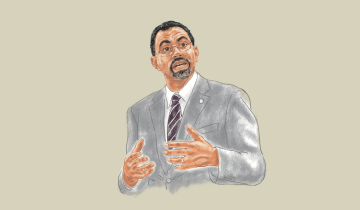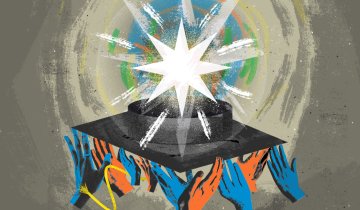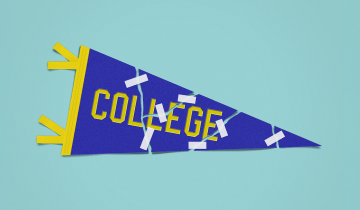The process of applying to college is often a strenuous one for many high school students. But for students in underserved schools, just figuring out how to apply to college can be a challenge in itself, according to USC Rossier alumna Regina Abesamis MS ’06.
As a postsecondary coach at the University of Chicago, Abesamis collaborates with Chicago Public Schools to provide pre-college counseling to high school students in order to improve graduation rates, college acceptance rates and overall academic achievement.
“My priorities lie in creating a college-going culture in schools,” said Abesamis. “The goal is to create social capital lacking for many students in their schools and neighborhoods.”
At the University of Chicago, Abesamis works with the School of Social Service Administration’s Network for College Success (NCS) to strengthen school leadership, improve teaching and implement data and research to best serve high school students.
“There are a total of 18 schools in the Network for College Success,” said Abesamis. “We work to bridge the gap between low-income, first-generation students and higher education.”
As a first-generation college student herself, Abesamis found preparing for standardized tests, applying for financial aid and completing other college application prerequisites in high school to be difficult. Though Abesamis’ parents, who emigrated from the Philippines, encouraged her to succeed, they weren’t familiar with all of the resources she needed to prepare for college.
“My parents always expected that I was going to college, but the application process was hard,” said Abesamis. “They even paid for a college preparation program which ended up being a scam. It was difficult because they wanted to help but didn’t know how.”
Growing up in West Covina, Calif., Abesamis attended Rowland Heights High School and said that students learned more about the college application process from their peers than from teachers and counselors. This lack of support was a driving factor in Abesamis’ interest in counseling students for college preparation.
“I think that if I had better support from my school, I would have been able to navigate the college application and financial aid process much better,” said Abesamis. “I didn’t even complete the FAFSA throughout college because I didn’t know any better, and my parents didn’t know about it either.”
After navigating the college application process and being accepted to UC Irvine, Abesamis was able to help her younger cousins understand college applications and financial aid, including the Free Application for Federal Student Aid (FAFSA), an annual application for federal financial aid for higher education.
While working with preschool aged students as an undergraduate at UC Irvine, Abesamis became interested in counseling as a career.
“I really liked working in urban education,” said Abesamis. “But I was more interested in post-secondary education.”
She earned her bachelor’s degree in psychology and social behavior in 2003, and enrolled at USC Rossier in 2004 to pursue her master’s degree in counseling psychology. During her studies at USC, Abesamis became a member of the Phi Kappa Phi honor society, a highly selective academic honors organization.
Abesamis credits her education at Rossier with preparing her to work with data and apply research in practical ways.
“So much of what we do at the University of Chicago is data-based,” said Abesamis. “I really learned to socialize data and translate it so that it benefits students. It’s important to bridge the gap between research and practice.”
Working in the third-largest school district in the United States, Abesamis said that the diversity of her education and the internship experience she gained in urban school settings during her time at USC Rossier also prepared her to become a leader in bettering Chicago Public Schools.
My background in urban education is certainly relevant to what I’m doing, and educational reform really ties into my education at Rossier. A lot of what a counselor does is personal and social, so I really took a lot from my marriage and family counseling classes at Rossier, too.
– Regina Abesamis
After graduation from USC Rossier, Abesamis served as a school counselor in the Santa Ana Unified School District. Following budget cuts which eliminated many faculty positions in the district, Abesamis decided that she wanted a change, and chose to continue her counseling career in Chicago.
“I chose Chicago randomly, and went to a job fair there,” said Abesamis. “Having USC on my resume really made schools want to hire me.”
After five years as a Counseling Department Chair with Chicago Public Schools, Abesamis was asked to join the Network for College Success at the University of Chicago, and though she no longer works with students on a day-to-day basis, she said that being able to address issues in education on a larger scale is just as fulfilling.
“I get to help a broader scope of students now,” said Abesamis. “It’s a very rewarding role.”
Abesamis is currently working with NCS in partnership with the Associated Colleges of the Midwest on The Pipeline Project 3.0 initiative, which is designed to increase the number of qualified Chicago Public Schools students who enroll in and graduate from selective universities.
“My goal is to explain graduation rates and financial aid to students, and create access to highly selective colleges,” said Abesamis. “This program is based off of the research of [CNS founder] Melissa Roderick, who found that many Chicago students are “undermatching” or going to less selective schools than they are qualified for, because that’s all they know.”
After moving to Chicago, Abesamis was also able to further another one of her passions—yoga—and became certified to teach.
“Counseling is a very stressful and demanding job,” said Abesamis. “Yoga is a nice balance.”
Despite the sometimes stressful nature of her work, Abesamis said that seeing students create and achieve their goals makes it all worthwhile.
“I’m really enjoying my work,” said Abesamis. “I love seeing students succeed because of CNS programs. I can see myself doing this for a long time.”



